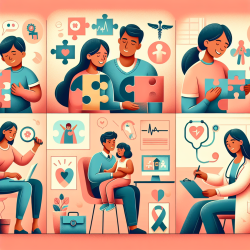The diagnosis and treatment of Autism Spectrum Disorder (ASD) among Mexican heritage families face unique challenges. A recent study titled "ASD Diagnosis and Treatment Experiences Among Mexican Heritage Families" provides valuable insights into these challenges and offers practical recommendations for practitioners. This blog will explore key findings from the study and suggest ways to implement these insights to improve outcomes for children with ASD.
Understanding the Diagnosis Pathways
The study involved interviews with 38 Mexican-heritage mothers about their experiences in obtaining an ASD diagnosis for their children. The findings revealed that most children (84%) were diagnosed between two and three years old, but one-third of mothers reported receiving four to seven referrals before obtaining a diagnosis. The study identified several structural barriers that complicated the diagnosis and treatment process, such as immigration status, initial diagnosis rejection among caregivers, and abrupt service cancellations.
Key Findings and Recommendations
- Early Diagnosis and Referrals: The study found that proactive healthcare provider responses and culturally appropriate screening tools are crucial for early diagnosis. Practitioners should use robust screening tools specifically developed for Latino children to detect ASD early.
- Addressing Structural Barriers: Structural factors like undocumented status can hinder timely diagnosis. Policymakers and practitioners should work together to create standardized, transparent pathways for diagnosis that mitigate these barriers.
- Family and Community Involvement: Extended family members often play a pivotal role in identifying developmental concerns. Practitioners should engage with families and communities to support the diagnosis process.
- Advocacy and Empowerment: Parental advocacy is essential for navigating the complex healthcare system. Advocacy programs that empower Latino families can support them in obtaining timely and appropriate services.
Implementing the Insights
Practitioners can improve their skills by integrating the study's findings into their practice. Here are some actionable steps:
- Utilize culturally appropriate screening tools and ensure they are available in multiple languages.
- Develop clear, simple pathways to diagnosis and advertise them in local communities.
- Engage in continuous communication with families, providing transparent information about the diagnosis process.
- Collaborate with community leaders and extended family members to support the child’s development.
- Advocate for policies that provide equitable access to healthcare services, regardless of immigration status.
By implementing these recommendations, practitioners can help mitigate the barriers identified in the study and improve the diagnosis and treatment experiences for Mexican heritage families. To read the original research paper, please follow this ASD Diagnosis and Treatment Experiences Among Mexican Heritage Families.










